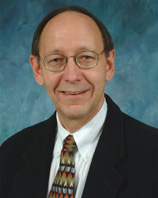Michael Mann, Ph.D., is one of four faculty members who will receive UNMC’s Outstanding Teacher Award Thursday, April 11 at 4 p.m. during the Annual Faculty meeting in the Eppley Science Hall Amphitheater. He is the final award recipient to be profiled.
To Michael Mann, Ph.D., professor of physiology and biophysics, teaching is the same no matter who the students are – whether they are in his neurophysiology classes at UNMC or in the elementary science classes where he once volunteered.
“You’re dealing with a different knowledge base so you have to reduce things to a different starting point. But teaching children is really not that different than teaching adults,” Dr. Mann said. “The average adult attention span isn’t much longer than a child’s – so you have to change what you’re doing about every 15 minutes or so to keep students engaged.”
Dr. Mann would know. To make his lessons as effective as possible, Dr. Mann studies learning theory and constructs his lessons around the way the brain learns and is influenced. Even his wardrobe is based on how people learn.
“Students were studied to see how appearance affects performance,” he said. “The people who dressed well performed better. I thought that same theory might apply to teaching. That’s why I wear a suit when I teach.”
Dr. Mann’s first teaching experience came in the form of children’s Sunday school classes in Spanish while he was an undergraduate student at the University of Southern California in Los Angeles. After he earned a degree in psychology and mathematics, Dr. Mann went to Cornell University in Ithaca, N.Y., where he earned his Ph.D. in neurobiology and behavior.
After spending a few years at the University of Washington in Seattle as a post-doctoral trainee, Dr. Mann joined UNMC in 1973 as an assistant professor of physiology and biophysics. He has written 21 articles and 33 research papers on brain research, including the evolution of the brain. Lately Dr. Mann has been focusing his time on teaching instead of research.
“I decided that I would probably have a bigger impact on the world teaching than doing research,” he said.
Dr. Mann’s book on the nervous system that was published in 1981 is still used by his students. Because the book is out of print and difficult to find, he retained the publishing rights and converted the text to a Web format. The book — in its entirety — is available to his students on the Internet, complete with simple animations and audio designed by Dr. Mann.
During his nearly 30 years at UNMC, he has been involved in the community. For more than 10 years he taught in Omaha Public Schools as a volunteer science teacher. Today, Dr. Mann is actively involved with the Boy Scouts, where he is a Scout leader and trains other adults to be leaders.
Nominators praised Dr. Mann for his patience with students and innovative approaches to teaching. One nominator said: “He often focused on challenging the status quo as an exercise in developing critical thinking — a favorite topic of his — frequently addressing ethical issues before these came so much to the forefront in basic research.”
Dr. Mann’s teaching philosophy is to question generally accepted scientific ideas, even those that may be a part of the students’ regular lesson plans. Students visiting his office come face to face with a poster that reads: Biologists should practice discarding one cherished notion every day before breakfast.
“You can’t be an effective scientist unless you do that,” Dr. Mann said. “There are ideas in science that are around simply because they’re comfortable. I ask students, ‘Do you really believe that?'”
“I’m not so interested in students memorizing symptoms. I want them to understand the nervous system so they can reason clearly about neural function and have gut feelings about whether particular explanation of neurological phenomena are true or false.”